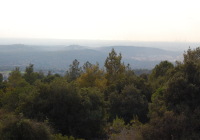In Badash’s Battle to Displace the Tarabin – all Means are Fair! Yeela Raanan, RCUV. April 30, 2009
The police have been hassling the residents of Amra Tarabin village for the last week and a half, in order to “convince” them to leave their village to a new location. the measures they have been using are astounding.
Pini Badash, the head of the municipal council of the affluent Jewish town of Omer, a suburb of Beer Sheva, wants to enlarge the town, and build a new neighborhood. The government approved the new municipal boundaries, the plans are completed, there is only one problem: there is a Bedouin village in that spot, the unrecognized village of Amra Tarabin, one of the 45 unrecognized Bedouin villages in the Israeli Negev.
So far Badash has succeeded in convincing 60% of the village residents to relocate. The methods he used are sufficiently questionable, that the process is being deliberated in the Israeli courts. But Badash is not waiting for the court verdicts, he is using all means of “legal” measures to convince the remaining residents to leave. Such as using the police for the last couple of weeks.
Following are some of the persuasion tactics. In order to understand the atrociousness of these tactics, imagine the village: 60 families, each with many young children, a very traditional society, in which the tradition demands that the women stay protected. The village space is their space, and most if not all, do not even speak Hebrew. The village is unrecognized, meaning there is no infrastructure, no roads. Entering the village is like entering someone’s home. And yet:
· Every day during the last week and a half, the policemen enter the village for the duration of hours. They stop people in the village, photograph them, record their dress, even the color of their shoes. They demand the names and other identifying information. When the police are in the village, the women hide in their homes. All this for no given reason.
· The police managed to secure search warrants to two homes. They turned the house upside down. The police explained: we have complaints about someone phoning and harassing people. We are searching for the phones. And indeed, during the search the police took the (broken) phone of a 3-year-old boy as evidence. The man of the house was in the hospital at the time, as his brother was undergoing an operation. So after the police finished “searching” his home, scaring the wife and children, he was requested to come to the police station for investigation. At the station the police showed him a list of phone numbers and asked, “Do you recognized these phone numbers?” Shocked he answered “No”, so they fingerprinted him, photographed him (again…), and sent him home.
· One evening the police entered a home and arrested an eight-year-old. They said he is suspected of stealing. They took him to the police station for investigation, not allowing his parents or anyone else to be there with him. Two hours later he was released to the anxiously waiting parents.
· Late one night, when everyone was asleep, a police car drove around the village, with the sirens blaring. It was a desperate attempt to provoke the residents.
· On Saturday a slightly retarded 16-year-old village boy walked around, and the police came to catch him. Scared he started running and the police chased him with their car, almost running him over. He was taken to the police station and left overnight in custody. The next day the judge released him to house arrest. The allegation: he was walking towards the tractors (that are there to build the infrastructure of the new neighborhood of Omer, and are protected around the clock by police.)
· His father was at the trial. At the completion of the trial the police asked the father to come to the station. There for two hours they tried to convince him that it would be good for him if he left the village…
· Najib Tarabin is a paramedic that works in the city of Rahat. On his way home the police stopped him and searched his car, as part of the harassment treatment. They found medicines in his car. “Aha!” they thought, this must be illegal, good! However, after 30 minutes of inquiry, it turns out everything was legal, these were emergency supplies intended for the people of Trabin. So the police then asked Najib “Why don’t you leave the village?” …
· The police placed a checkpoint at the entrance to the village. Any vehicle entering or exiting the village must go through a thorough check of the car and all its paperwork, a check that takes up to 20 minutes. There are about 20 vehicles in the village. Each one has gone through this check at least 10 times in the past 10 days…


